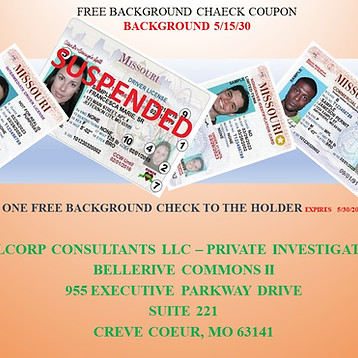
What is a Private Eye?
- Wilcorp Consultants

- Mar 10, 2019
- 2 min read
Updated: Sep 29, 2024

What is a private investigator?
Private investigators, also known as private eyes, private detectives, or P.Is., are hired professionals specializing in research, surveillance and other methods of investigation. Although PIs are not police officers, many have a criminal justice background and certain states even require this experience to be able to work as a licensed private investigator. PIs will work for private individuals or companies and attorneys may hire private detectives to find out information for a case.
What does a private investigator do?
Private investigators can cover a wide range of work. Not all PIs do all these things, so its important to find an investigator who has experience or expertise that matches the job you are wanting to have done. Common work for a private investigator includes:
Investigating an individual such as a spouse or partner suspected of cheating or a person suing you for an injury that you aren’t convinced is injured.
Finding an individual such as a long-lost relative or someone who owes you money and left town.
Locating objects such as stolen property.
Investigating crime such as in-house theft for a business or a home invasion of an individual when the client feels regular police attention isn’t enough.
Background checks for potential new employees or others.
Setting up surveillance equipment and monitoring including GPS monitoring.
Case research for attorneys.
Private investigator cost:
For certain services such as background checks, looking up a vehicle registration or identifying a cell phone number, private investigators may charge a flat fee. Most commonly, though, private investigators charge an hourly rate. Depending on your location, complexity of the work and expertise of the private investigator, fees can range from $150 to over $300 per hour with the average somewhere around $350 an hour in the United States.
Be aware that depending on the work being done, there may be cost to hiring a private investigator beyond the hourly rate. You may need to be prepared to pay expenses such as plane tickets, hotel rooms, long-distance phone calls, equipment costs or gas milage. Some private investigators may require a deposit or retainer upfront to cover potential expenses.
Be sure to have a written contract upfront that outlines all potential costs. Your private investigator should inform you beforehand if something changes and will require an increase in the cost. Always ask for an itemized list of expenses and specific records of activities you are being charged for to be given to you at the end of the job.
Hiring a private investigator:
Finding a trustworthy and qualified private investigator can be an intimidating task so here are some tips to help you know how to hire a private investigator.
Tune in next week for more.
















Comments